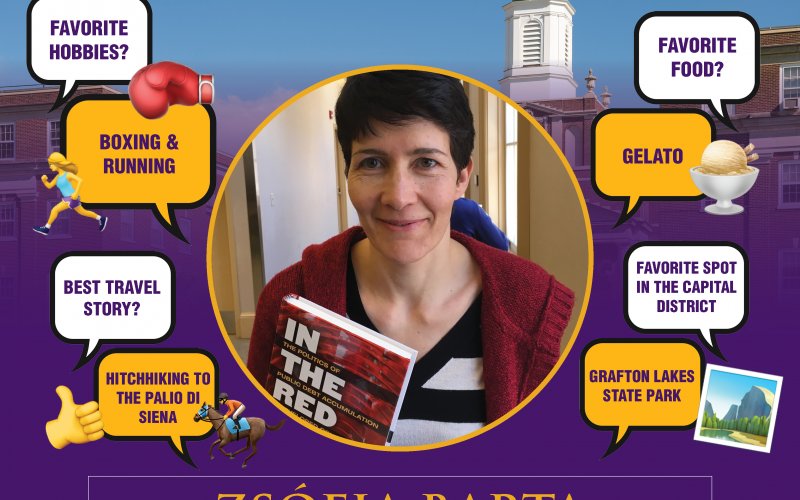Faculty Q&A: Zsófia Barta

Name: Zsófia Barta
Title: Assistant Professor
Department: Department of Political Science
What brought you to Rockefeller and how long have you been here?
I started working at Rockefeller College in 2013. I was very excited to come to a department that was interested in my slightly unusual take on public policy -- one that is less concerned with the procedural, management-related aspects of policy-making and focuses more on how social conflicts and power shape policy choices and outcomes. Furthermore, they wanted someone who approaches public policy from a comparative angle (highlighting the similarities and differences between different countries’ policy choices), which is exactly what I do in my research. I was convinced that this position was perfect for me, and I haven’t been disappointed in the past six years.
Tell us about your research interests and why you are passionate about this topic?
My research focuses on public debt in prosperous developed countries. My first book, In The Red: The Politics of Public Debt Accumulation in Developed Countries, explained why rich countries get disastrously indebted. The book I am currently working on explores how heavily indebted countries become beholden to financial market actors, specifically sovereign credit rating agencies: how their political and policy autonomy is compromised by unelected, unappointed, profit-driven entities that hold sway over their fiscal viability. The issue of public debt in rich countries fascinates me because so many rich countries maneuvered themselves into a problem that is both avoidable and potentially catastrophic. I wanted to know what it is about the politics of excessively indebted rich countries that made them embark on such a dangerous policy path even though they did not have to, and how this problem then affects their politics and their room to choose the policies they want.
What do you want the public to know about your research? Why is your topic important?
The problem of public debt is going to become ever more significant in the coming years, because countries’ budgets are under increasing pressure from slow growth and aging, and many prosperous countries (including the US) are indebted to a historically unprecedented degree. My research shows that dealing with public debt is fundamentally about compromise. My first book demonstrates the immense costs of prolonged conflicts about spending and taxation, by showing how political stalemate on these issues bankrupted Greece, and brought Italy and Japan close to the brink. I think it might help if the public was more aware of the risks of intransigence on budgetary matters. At the same time, by highlighting how financial market actors like credit rating agencies constrain what governments can and cannot do, by virtue of controlling governments’ access to funding, my research also calls attention to the influence of private actors on politics and policy outside of the regular political channels (like lobbying and campaign contributions).
What is your favorite part of your job?
I love research and writing. I get thoroughly immersed in the topics that fascinate me. At the same time, I do get burnt out by focusing so intensely on one issue for extended periods of time, and teaching provides a welcome respite from that. I love interacting with students who are interested in politics and are motivated to learn. That is why I feel so lucky to be in charge of the honors program. It is really rewarding to see our best students achieve their true potential and do truly excellent work.
What are your favorite hobbies?
Boxing and running.
What are your “trapped on a desert island” books or movies?
I can’t choose one. If I am allowed three, I’d take ‘The Magic Mountain’ by Thomas Mann and ‘Satan’s Tango’ by László Krasznahorkai for books and a movie called ‘In the Mood for Love’ by Wong Kar-wai.
What’s your favorite food to eat or cook?
Gelato. I got hooked when I lived in Italy for two years. I think I ate gelato every day while I was there.
What is your best travel story?
I wanted to go to Siena (Italy) to see the famous Palio (a medieval horse race in the main square of the city) with a friend, but we missed the bus, so we decided to hitchhike. We got picked up by an older guy who turned out to be an organizer for one of the contradas (the city quarters that field the jockeys for the race), and soon I found myself invited to a traditional pre-race celebratory dinner, eating amazing food with hundreds of people living in the contrada, talking and singing with the locals, and given a flag of their contrada so that I can cheer for their team the next day. Missing the bus that afternoon ended up giving me a unique local experience that I had previously only dreamed of. I have missed many buses since, but it never ended up being such a lucky accident ever again.
What is your favorite spot in the Capital District?
Grafton Lakes State Park. Swimming, hiking, kayaking, and biking in the most beautiful, serene, and peaceful environment. What more can one ask for?


